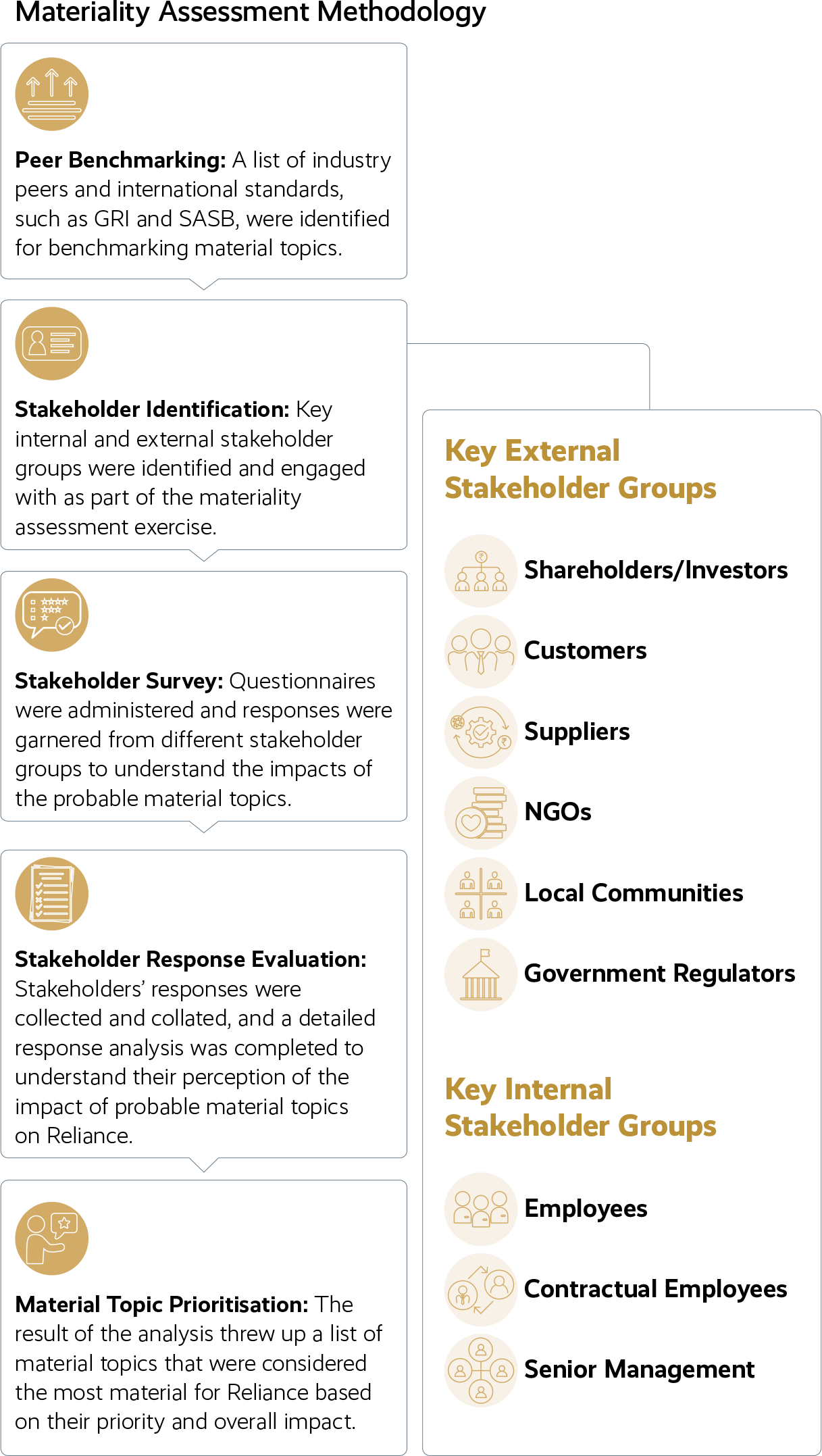Reliance is committed to proactively identifying and responding to the most pertinent needs of stakeholders and its business to create long-term value for all. Prioritising the interests of its stakeholders allows Reliance to develop stronger relationships with them, resulting in positive business outcomes such as increased revenue, market share, and brand reputation. Reliance designs and manages a sustainable and responsible business model that recognises the significant role stakeholders play in shaping the Company’s long-term success.
Materiality Approach
Reliance operates in dynamic environments. The Company continually assesses issues that are most material to its business and stakeholders and prioritises critical topics that need to be addressed as part of its business activities. Reliance conducted a materiality assessment for the listed entity in FY 2021-22 to identify material issues based on international reporting standards. The assessment also prioritised key internal and external stakeholders with the most impact and influence on Reliance. Relevant stakeholder engagement mechanisms were used to capture the inputs of the identified stakeholders on the potential material1 issues. Each potential material issue was analysed in detail, taking into account the inputs from stakeholders and management. The material topics were then prioritised based on both management and stakeholder perspectives.

Our Material Topics


 Climate Change
Climate Change 
 Managing Environmental Impacts
Managing Environmental Impacts 
 Energy Efficiency of Operations
Energy Efficiency of Operations 
 Water and Effluent Management
Water and Effluent Management 
 Raw Material Security
Raw Material Security 
 Ecosystem and Biodiversity
Ecosystem and Biodiversity 
 Innovation and Technology
Innovation and Technology 
 Waste Management and Circular Economy
Waste Management and Circular Economy 
 Sustainable Supply Chain Management
Sustainable Supply Chain Management 
 Disaster Preparedness and Management
Disaster Preparedness and Management 
 Health, Safety and Employee Well-being
Health, Safety and Employee Well-being 
 Diversity and Inclusion
Diversity and Inclusion 
 Customer Satisfaction
Customer Satisfaction 
 Data Privacy and Cybersecurity
Data Privacy and Cybersecurity 
 Security and Asset Management
Security and Asset Management 
 Talent Management
Talent Management 
 Community Development
Community Development 
 Labour Management
Labour Management 
 Human Rights
Human Rights 
 Business Ethics, Integrity and Transparency
Business Ethics, Integrity and Transparency 
 Regulatory Issues and Compliance
Regulatory Issues and Compliance 
 Grievance Redressal Mechanisms
Grievance Redressal Mechanisms 
 Risk Management
Risk Management 
 Economic Performance
Economic Performance 
 Code of Conduct
Code of Conduct 
Double Materiality
As a Company that strongly focuses on integrating the key concerns and needs of its stakeholders into its business and sustainability strategy, Reliance has identified double material issues. This will help Reliance evaluate the cross-impact of material issues on the environment and society against its impact on the Company. Double materiality assessment will allow the Company to recognise the impact of material issues holistically and enhance the transparency and breadth of ESG disclosures.
Material Issue and Associated Capital

 Reliance faces several physical and transitional risks related to climate change. Physical risks include climate-related events that can impact the Company’s financial stability and value creation capabilities. Transitional risks stem from changes in the energy market as the world progresses towards a more sustainable future and embraces cleaner energy forms. Failure to adapt to these changes could lead to decreased profitability and stakeholder value and regulatory penalties.
Reliance faces several physical and transitional risks related to climate change. Physical risks include climate-related events that can impact the Company’s financial stability and value creation capabilities. Transitional risks stem from changes in the energy market as the world progresses towards a more sustainable future and embraces cleaner energy forms. Failure to adapt to these changes could lead to decreased profitability and stakeholder value and regulatory penalties.
 Reliance’s O2C operations have a greater environmental impact than its Retail and Telecom businesses. Abating emissions from O2C is challenging due to the nature of its activities. Burning fossil fuels during O2C operations releases greenhouse gases (GHG), resulting in environmental impacts such as air and water pollution, habitat destruction, and the release of toxic chemicals.
Reliance’s O2C operations have a greater environmental impact than its Retail and Telecom businesses. Abating emissions from O2C is challenging due to the nature of its activities. Burning fossil fuels during O2C operations releases greenhouse gases (GHG), resulting in environmental impacts such as air and water pollution, habitat destruction, and the release of toxic chemicals.

 Effective environmental management is important for Reliance to comply with regulations, avoid legal risks, and maintain a positive reputation. It is, therefore, critical for the Company to assess potential risks associated with its operations and mitigate them by reducing emissions, minimising water use, and preventing waste and pollution. Failure to do so could result in legal action, fines, and reputational damage. Prioritising environmental sustainability demonstrates Reliance’s commitment to responsible corporate citizenship, protecting brand reputation and contributing to a more sustainable future.
Effective environmental management is important for Reliance to comply with regulations, avoid legal risks, and maintain a positive reputation. It is, therefore, critical for the Company to assess potential risks associated with its operations and mitigate them by reducing emissions, minimising water use, and preventing waste and pollution. Failure to do so could result in legal action, fines, and reputational damage. Prioritising environmental sustainability demonstrates Reliance’s commitment to responsible corporate citizenship, protecting brand reputation and contributing to a more sustainable future.
 Reliance’s O2C business has significant environmental impacts related to GHG emissions, water use, waste generation, ecosystems and biodiversity. In addition, the O2C business can negatively impact the health and wellbeing of stakeholders, including workers, local communities, and consumers.
Reliance’s O2C business has significant environmental impacts related to GHG emissions, water use, waste generation, ecosystems and biodiversity. In addition, the O2C business can negatively impact the health and wellbeing of stakeholders, including workers, local communities, and consumers.

 Non-compliance with regulations related to land use, greenfield expansions, rehabilitation and redevelopment can expose the Company to regulatory and legal risks. Hence, it becomes imperative for Reliance to work with all stakeholders and address ecosystem and biodiversity issues.
Non-compliance with regulations related to land use, greenfield expansions, rehabilitation and redevelopment can expose the Company to regulatory and legal risks. Hence, it becomes imperative for Reliance to work with all stakeholders and address ecosystem and biodiversity issues.
 Reliance’s O2C business can have a negative impact on biodiversity through various activities such as habitat fragmentation, deforestation, and erosion. This can result in the loss of habitats for wildlife, as well as cause a decline in the diversity and abundance of species.
Reliance’s O2C business can have a negative impact on biodiversity through various activities such as habitat fragmentation, deforestation, and erosion. This can result in the loss of habitats for wildlife, as well as cause a decline in the diversity and abundance of species.

 The Company generates various forms of waste from the processing and storage of petroleum products. Many of these substances are hazardous to human health and the environment and may be subject to regulations. Reliance O2C unit reduces and recycles hazardous waste streams and has effective and prompt clean-up and remediation measures to ensure seamless operations. The Company has a structured process to manage decommissioned facilities to reduce regulatory and litigation risks and associated costs.
The Company generates various forms of waste from the processing and storage of petroleum products. Many of these substances are hazardous to human health and the environment and may be subject to regulations. Reliance O2C unit reduces and recycles hazardous waste streams and has effective and prompt clean-up and remediation measures to ensure seamless operations. The Company has a structured process to manage decommissioned facilities to reduce regulatory and litigation risks and associated costs.
 Reliance’s O2C operations generate high volumes of hazardous waste that can negatively impact the environment and human health. Reliance Retail and Jio also generate substantial waste from the use of paper, plastic, and packaging. Appropriate waste management practices are essential to minimise their impact on people and the planet. Reliance undertakes various initiatives to reduce waste and promote sustainability across its business segments, such as recycling PET bottles and used PPEs and developing and deploying waste-to-road and waste-to-oil technology solutions.
Reliance’s O2C operations generate high volumes of hazardous waste that can negatively impact the environment and human health. Reliance Retail and Jio also generate substantial waste from the use of paper, plastic, and packaging. Appropriate waste management practices are essential to minimise their impact on people and the planet. Reliance undertakes various initiatives to reduce waste and promote sustainability across its business segments, such as recycling PET bottles and used PPEs and developing and deploying waste-to-road and waste-to-oil technology solutions.

 Workers involved in various manufacturing activities could face significant health and safety risks due to the harsh working environments and the hazards of handling oil and gas. In addition to acute impacts resulting from accidents, workers may develop chronic health conditions. Therefore, worker health and safety performance can have an impact on Reliance’s operations and profitability. RIL recognises the importance of healthy and safe working conditions as a human right, implementing a globally benchmarked HSE framework across all sites, services, and offices
Workers involved in various manufacturing activities could face significant health and safety risks due to the harsh working environments and the hazards of handling oil and gas. In addition to acute impacts resulting from accidents, workers may develop chronic health conditions. Therefore, worker health and safety performance can have an impact on Reliance’s operations and profitability. RIL recognises the importance of healthy and safe working conditions as a human right, implementing a globally benchmarked HSE framework across all sites, services, and offices
 The Company’s operations across business segments impact Goal 3, underlined in the UN SDGs, which aims to ensure healthy lives and promote wellbeing for all.
The Company’s operations across business segments impact Goal 3, underlined in the UN SDGs, which aims to ensure healthy lives and promote wellbeing for all.
UN SDG: 3.8: Achieve universal health coverage, including financial risk protection, access to quality essential healthcare services and access to safe, effective, quality and affordable essential medicines and vaccines for all.
UN SDG: 3.9: By 2030, substantially reduce the number of deaths and illnesses from hazardous chemicals and air, water and soil pollution and contamination.

 Reliance offers peer-benchmarked monetary and nonmonetary benefits to enhance employee engagement and improve retention and productivity. Initiatives to improve employee engagement and work-life balance can positively influence the recruitment and retention of a diverse workforce.
Reliance offers peer-benchmarked monetary and nonmonetary benefits to enhance employee engagement and improve retention and productivity. Initiatives to improve employee engagement and work-life balance can positively influence the recruitment and retention of a diverse workforce.
 Reliance has robust talent management systems to identify high-potential employees and provide opportunities for career growth and development. This helps to retain top talent, create a culture of continuous learning, and build a more skilled and knowledgeable workforce that can drive business performance and innovation. Effective talent management plays a crucial role in improving both employee experience and client satisfaction, which ultimately leads to higher business performance and Return on Investment for Reliance.
Reliance has robust talent management systems to identify high-potential employees and provide opportunities for career growth and development. This helps to retain top talent, create a culture of continuous learning, and build a more skilled and knowledgeable workforce that can drive business performance and innovation. Effective talent management plays a crucial role in improving both employee experience and client satisfaction, which ultimately leads to higher business performance and Return on Investment for Reliance.

 The Company’s significance to the economy as a major employer means that it is also often at the centre of public discussions around labour practices. Therefore, poor performance in labour relations can have serious reputational implications for the Company.
The Company’s significance to the economy as a major employer means that it is also often at the centre of public discussions around labour practices. Therefore, poor performance in labour relations can have serious reputational implications for the Company.
Customers regularly interact directly with employees in the Retail business. Reliance can face a decrease in market share and revenues from negative customer sentiments generated due to public disagreements between the Company and its workers.
Read More Maintaining cordial labour relations is crucial for Reliance to ensure the wellbeing and productivity of its workforce. A healthy labour relationship means that both the management and the employees are led by a common purpose, which results in improved job satisfaction, employee retention, and organisational performance.
Maintaining cordial labour relations is crucial for Reliance to ensure the wellbeing and productivity of its workforce. A healthy labour relationship means that both the management and the employees are led by a common purpose, which results in improved job satisfaction, employee retention, and organisational performance.

 Reliance faces additional community-related risks when operating in sensitive areas to protect human rights and areas with vulnerable communities such as indigenous peoples. If Reliance is perceived to be violating human rights or failing to account for indigenous peoples’ rights, the operations of the Company may be affected due to protests, riots, or suspension of permits.
Reliance faces additional community-related risks when operating in sensitive areas to protect human rights and areas with vulnerable communities such as indigenous peoples. If Reliance is perceived to be violating human rights or failing to account for indigenous peoples’ rights, the operations of the Company may be affected due to protests, riots, or suspension of permits.
 Vulnerable sections of the population, with limited capacity to defend their rights and interests, may need added effort and support to ensure their human rights are protected. The Company’s governance structures and actions can account for the same
Vulnerable sections of the population, with limited capacity to defend their rights and interests, may need added effort and support to ensure their human rights are protected. The Company’s governance structures and actions can account for the same

 Managing business ethics and maintaining appropriate levels of transparency in payments to governments or individuals are significant issues for Reliance. Strong relations are critical to ensure the Company’s ability to conduct business. Inappropriate action or violation of business ethics could lead to significant one-time costs or higher ongoing compliance costs. Reliance ensures compliance with all regulations and has a well-established Code of Conduct that mandates ethical business behaviour at all times. These measures offer adequate risk mitigation opportunities and prevent adverse outcomes.
Managing business ethics and maintaining appropriate levels of transparency in payments to governments or individuals are significant issues for Reliance. Strong relations are critical to ensure the Company’s ability to conduct business. Inappropriate action or violation of business ethics could lead to significant one-time costs or higher ongoing compliance costs. Reliance ensures compliance with all regulations and has a well-established Code of Conduct that mandates ethical business behaviour at all times. These measures offer adequate risk mitigation opportunities and prevent adverse outcomes.
 Reliance has a well-established Code of Conduct that is applicable to its employees and the value chain, supported by strong governance structures and business practices to prevent corruption and wilful or unintentional participation in illegal or unethical payments or gifts to government officials or private persons.
Reliance has a well-established Code of Conduct that is applicable to its employees and the value chain, supported by strong governance structures and business practices to prevent corruption and wilful or unintentional participation in illegal or unethical payments or gifts to government officials or private persons.

 Establishing effective grievance redressal mechanisms is essential for Reliance to track the issues raised by stakeholders and take immediate action to resolve their concerns.
Establishing effective grievance redressal mechanisms is essential for Reliance to track the issues raised by stakeholders and take immediate action to resolve their concerns.
 Reliance has an effective mechanism to address the grievances of all stakeholders, including employees, suppliers, customers and communities. This encourages stakeholders to communicate their concerns to the management and expect prompt redressal.
Reliance has an effective mechanism to address the grievances of all stakeholders, including employees, suppliers, customers and communities. This encourages stakeholders to communicate their concerns to the management and expect prompt redressal.

 The availability of raw materials is crucial for the smooth running of Reliance’s business operations. Judicious use of raw materials can have long standing impact on the Company and local economy. Raw material security provides investors and other key stakeholders confidence in the ability of the Company to run operations seamlessly. The availability of raw materials can also directly impact Reliance’s ability to meet market demand for its products.
The availability of raw materials is crucial for the smooth running of Reliance’s business operations. Judicious use of raw materials can have long standing impact on the Company and local economy. Raw material security provides investors and other key stakeholders confidence in the ability of the Company to run operations seamlessly. The availability of raw materials can also directly impact Reliance’s ability to meet market demand for its products.
 The Company has helped boost the socioeconomic wellbeing of several local communities through its operations across India. Raw material security can directly impact Reliance’s ability to generate employment for local communities. A lack of raw material security may cause the Company to move its operations to different locations leaving behind overused/exploited spaces for local communities.
The Company has helped boost the socioeconomic wellbeing of several local communities through its operations across India. Raw material security can directly impact Reliance’s ability to generate employment for local communities. A lack of raw material security may cause the Company to move its operations to different locations leaving behind overused/exploited spaces for local communities.

 Data breaches can result in the leakage of confidential company information. Reliance’s extensive digital presence and large market share makes it a common target for such breaches. The Company has implemented several initiatives to make its technology framework secure and resilient and protect confidential assets and information.
Data breaches can result in the leakage of confidential company information. Reliance’s extensive digital presence and large market share makes it a common target for such breaches. The Company has implemented several initiatives to make its technology framework secure and resilient and protect confidential assets and information.
 Data privacy is a global concern that has increased significantly in the past few years. Access to private data and lack of digital privacy threatens the security and safety of millions of people worldwide. Reliance’s digital business is susceptible to data breaches, and the Company has implemented cutting-edge security measures and complies with all applicable regulations to protect its customers’ privacy.
Data privacy is a global concern that has increased significantly in the past few years. Access to private data and lack of digital privacy threatens the security and safety of millions of people worldwide. Reliance’s digital business is susceptible to data breaches, and the Company has implemented cutting-edge security measures and complies with all applicable regulations to protect its customers’ privacy.

 Reliance’s ability to adapt to changing trends and technology has made the Company one of the most successful businesses in the country. Reliance’s R&D operation is a crucial growth engine for the Company. Evolving market trends drive Reliance to develop innovative solutions and streamline existing mechanisms constantly. Innovation also accelerates organisational growth and strengthens the Company’s industry leadership.
Reliance’s ability to adapt to changing trends and technology has made the Company one of the most successful businesses in the country. Reliance’s R&D operation is a crucial growth engine for the Company. Evolving market trends drive Reliance to develop innovative solutions and streamline existing mechanisms constantly. Innovation also accelerates organisational growth and strengthens the Company’s industry leadership.
 The Company’s R&D team has a strong focus on developing sustainable solutions and alternatives to preserve the natural environment. Reliance’s streamlined processes and efficiency enhancements have significantly improved the quality of life for many. Reliance innovations have led to higher productivity, better results and increased motivation among people to do better.
The Company’s R&D team has a strong focus on developing sustainable solutions and alternatives to preserve the natural environment. Reliance’s streamlined processes and efficiency enhancements have significantly improved the quality of life for many. Reliance innovations have led to higher productivity, better results and increased motivation among people to do better.

 Reliance Retail relies heavily on third-party manufacturing partners. Any failure on the part of suppliers to comply with dynamically changing regulations and issues of human rights violations can disrupt the Company’s operations and create negative sentiments amongst stakeholders, including customers and impact business. The Company has a structured approach to enhancing supplier performance, deepening sustainability practices, and a well-defined Code of Conduct that mandates respect for human rights across the value chain.
Reliance Retail relies heavily on third-party manufacturing partners. Any failure on the part of suppliers to comply with dynamically changing regulations and issues of human rights violations can disrupt the Company’s operations and create negative sentiments amongst stakeholders, including customers and impact business. The Company has a structured approach to enhancing supplier performance, deepening sustainability practices, and a well-defined Code of Conduct that mandates respect for human rights across the value chain.
 Strong supply chain standards, monitoring mechanisms and ongoing engagement models with suppliers to address labour concerns are critical for Reliance to protect shareholder value over1 the long term. Sustainable supply chains are essential to further the Company’s progress on its Net Carbon Zero goal.
Strong supply chain standards, monitoring mechanisms and ongoing engagement models with suppliers to address labour concerns are critical for Reliance to protect shareholder value over1 the long term. Sustainable supply chains are essential to further the Company’s progress on its Net Carbon Zero goal.

 Extreme climatic situations can derail Reliance’s business operations across O2C, E&P, Retail and Telecom and impact the Company’s economic performance. Reliance is mindful of this and has set a goal to become a Net Carbon Zero company and created new growth engines, like the New Energy business. Future-proofing the Company against the disruptions of climate change is critical to protect its ability to grow revenue and profits, manage expenses and allocate resources, and generate adequate cash flows.
Extreme climatic situations can derail Reliance’s business operations across O2C, E&P, Retail and Telecom and impact the Company’s economic performance. Reliance is mindful of this and has set a goal to become a Net Carbon Zero company and created new growth engines, like the New Energy business. Future-proofing the Company against the disruptions of climate change is critical to protect its ability to grow revenue and profits, manage expenses and allocate resources, and generate adequate cash flows.
 Reliance is working on its Net Zero strategies led by investments to set up the world’s largest integrated manufacturing ecosystem for green energy. By prioritising economic performance, Reliance can increase its profitability and competitiveness and accelerate its progress on the Net Carbon Zero journey, benefiting its stakeholders, including shareholders, employees, customers, and suppliers.
Reliance is working on its Net Zero strategies led by investments to set up the world’s largest integrated manufacturing ecosystem for green energy. By prioritising economic performance, Reliance can increase its profitability and competitiveness and accelerate its progress on the Net Carbon Zero journey, benefiting its stakeholders, including shareholders, employees, customers, and suppliers.

 Reliance gains a competitive advantage by staying compliant as it demonstrates a commitment to transparency and accountability that is valued by customers, investors, and other stakeholders. In addition, compliance also promotes workforce engagement and retention, as employees feel proud to work for a company that upholds high ethical standards.
Reliance gains a competitive advantage by staying compliant as it demonstrates a commitment to transparency and accountability that is valued by customers, investors, and other stakeholders. In addition, compliance also promotes workforce engagement and retention, as employees feel proud to work for a company that upholds high ethical standards.
 Reliance places a high priority on regulatory compliance, especially in an evolving regulatory environment. The Reliance Compliance Management System is a comprehensive, digitally enabled framework regularly updated and integrated with business processes, risks, and controls. The Group Compliance Committee monitors regulatory changes and provides timely updates to Directors on key developments and judicial rulings.
Reliance places a high priority on regulatory compliance, especially in an evolving regulatory environment. The Reliance Compliance Management System is a comprehensive, digitally enabled framework regularly updated and integrated with business processes, risks, and controls. The Group Compliance Committee monitors regulatory changes and provides timely updates to Directors on key developments and judicial rulings.

 For Reliance, identifying and addressing probable risks proactively is critical to improving the likelihood of achieving business objectives successfully.
For Reliance, identifying and addressing probable risks proactively is critical to improving the likelihood of achieving business objectives successfully.
 Reliance places utmost importance on employees and ensures a reduction in the likelihood and severity of potential project risks through early identification and a ready action plan to handle untoward incidents.
Reliance places utmost importance on employees and ensures a reduction in the likelihood and severity of potential project risks through early identification and a ready action plan to handle untoward incidents.
![]() Impact on the Company
Impact on the Company ![]() Impact of the Company on the Environment and People
Impact of the Company on the Environment and People